Nurses Narratives Sister Alma L Bennett (part 2)
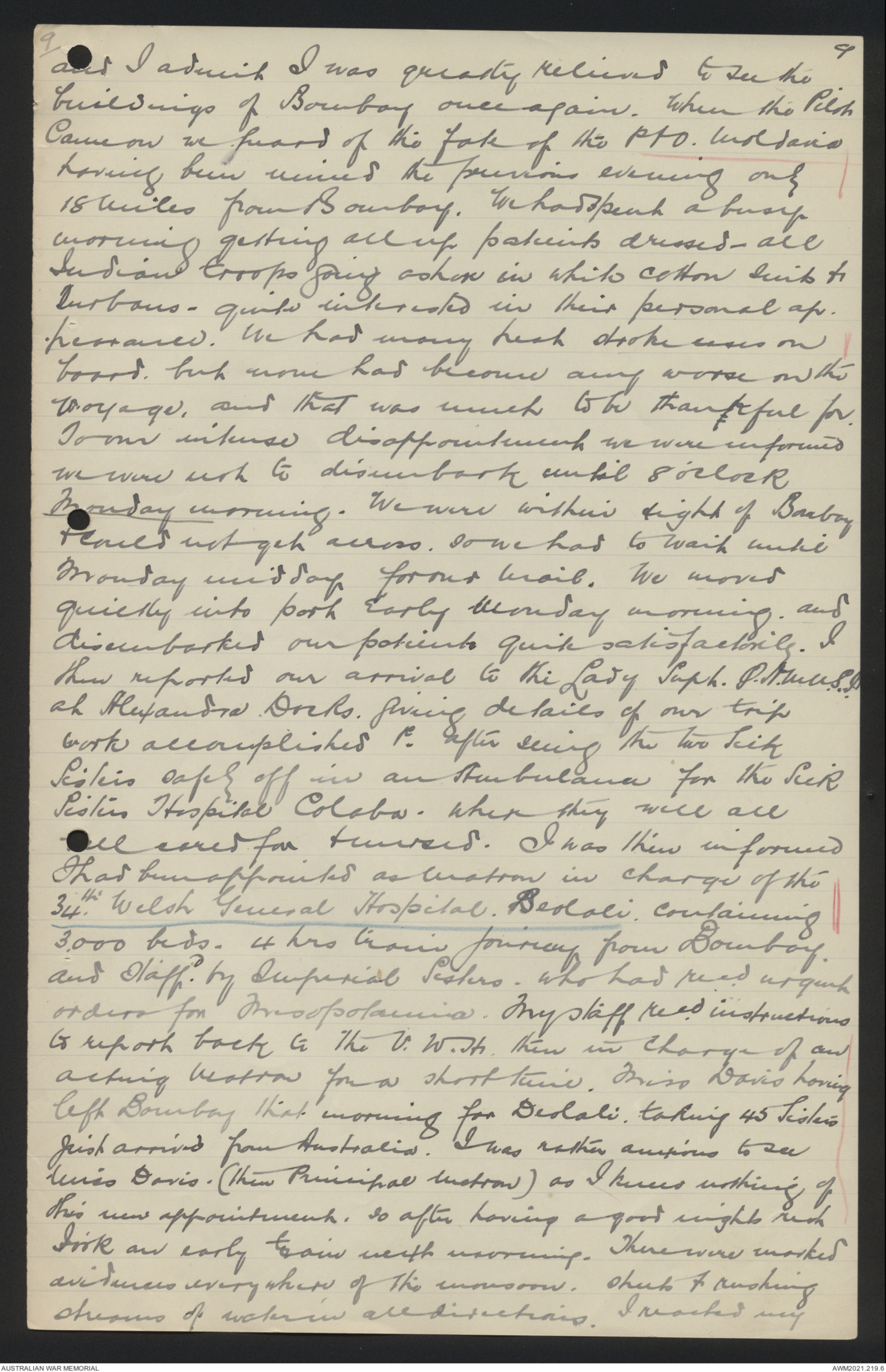
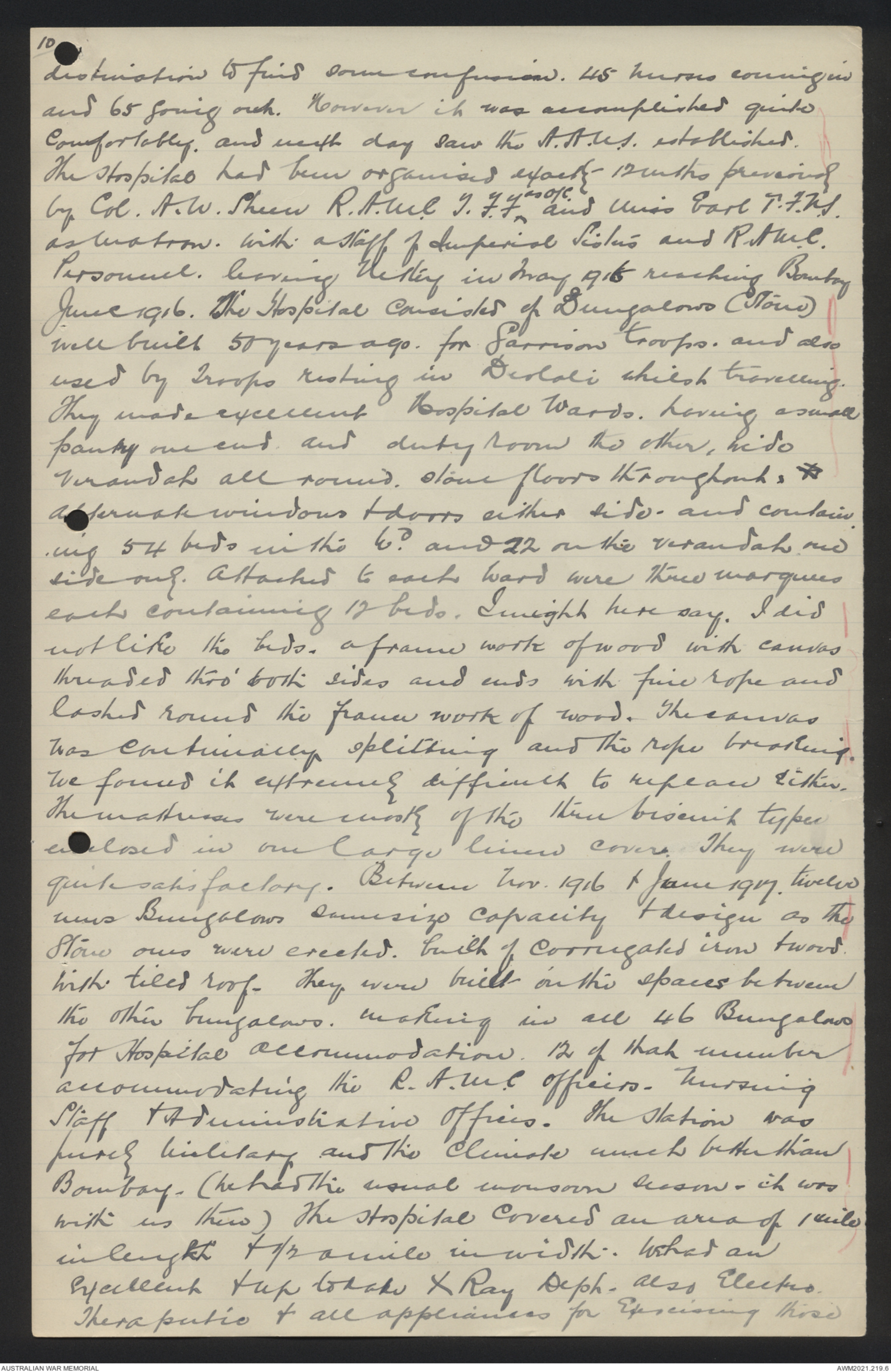
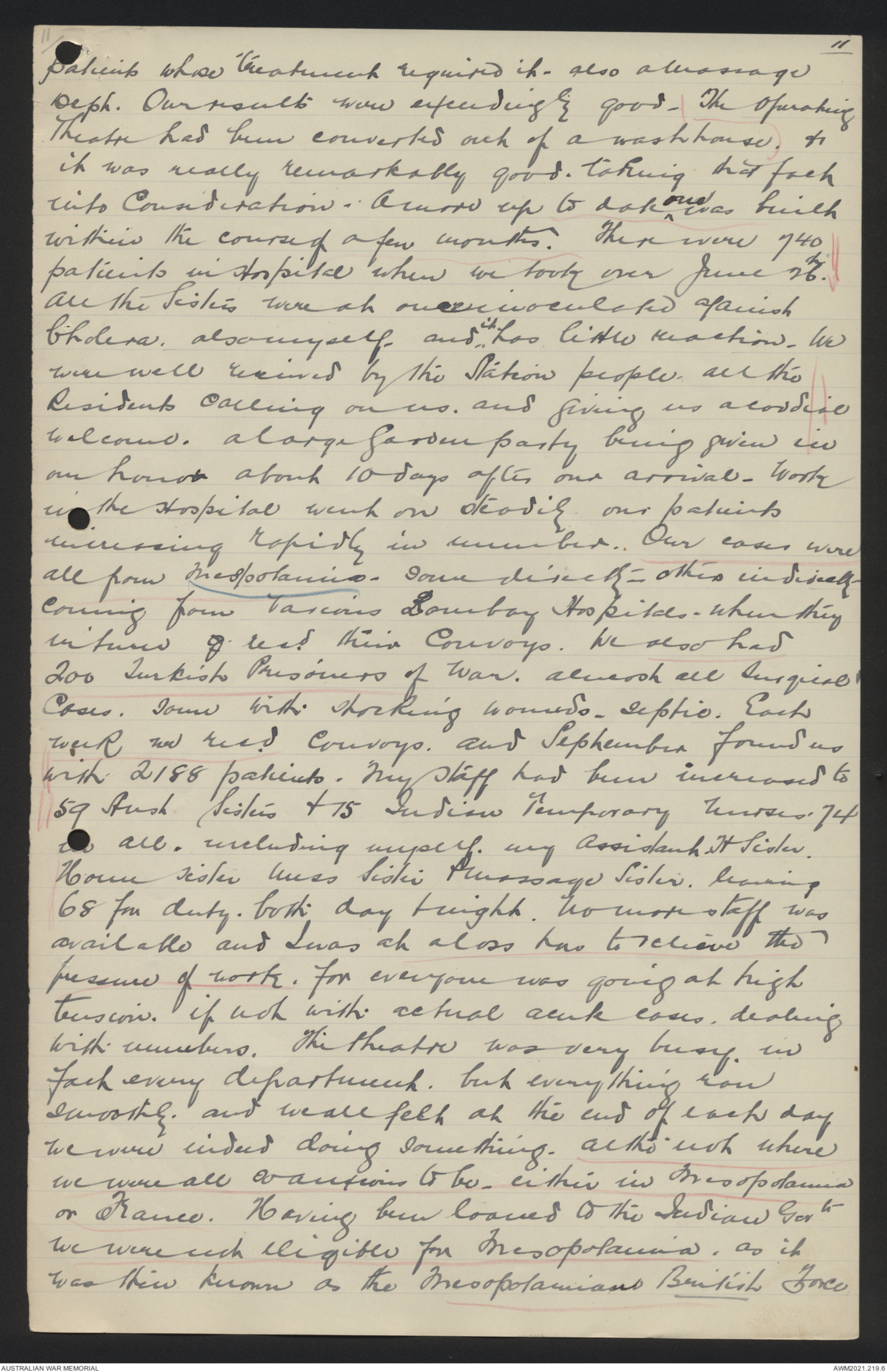
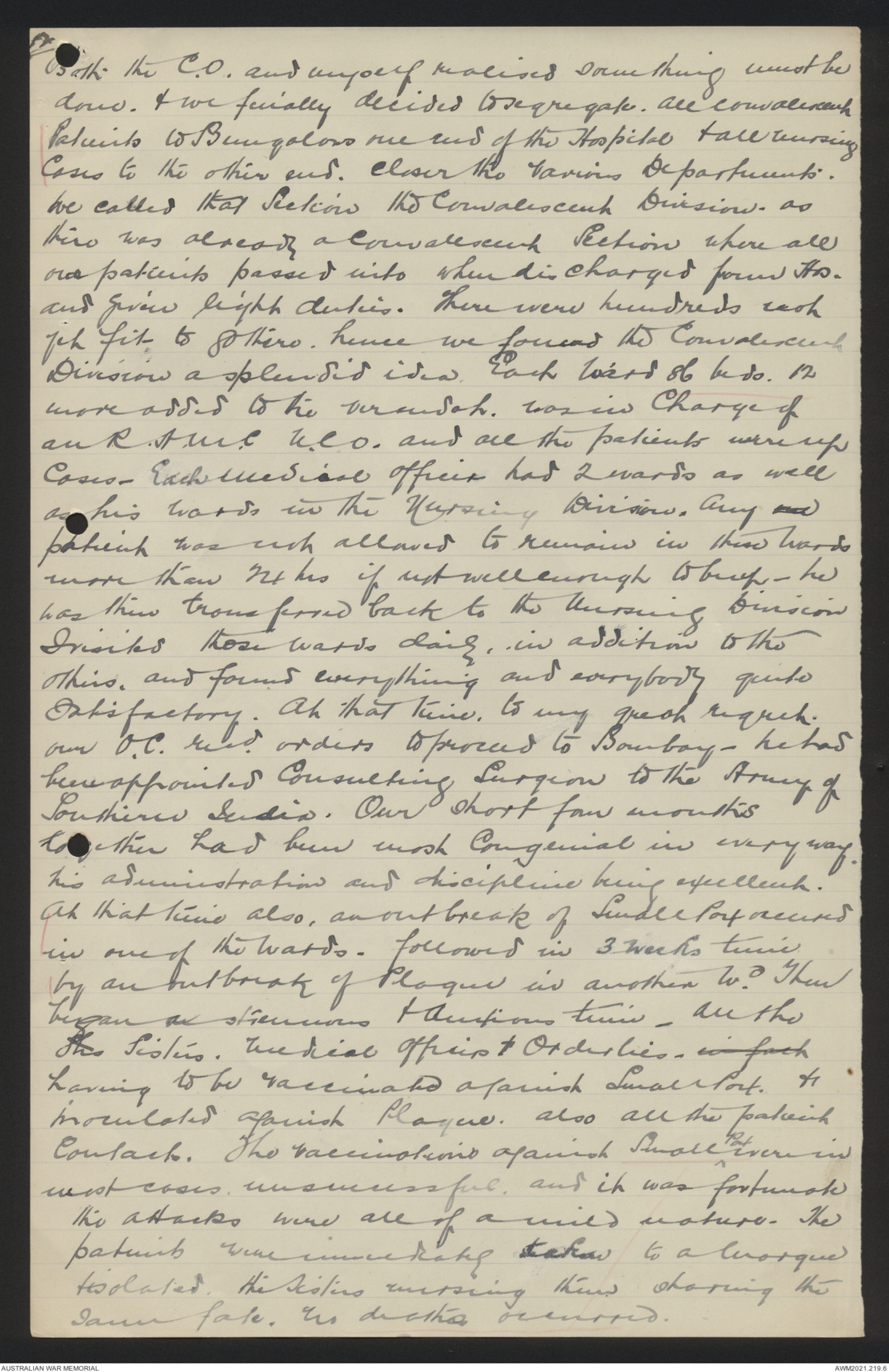
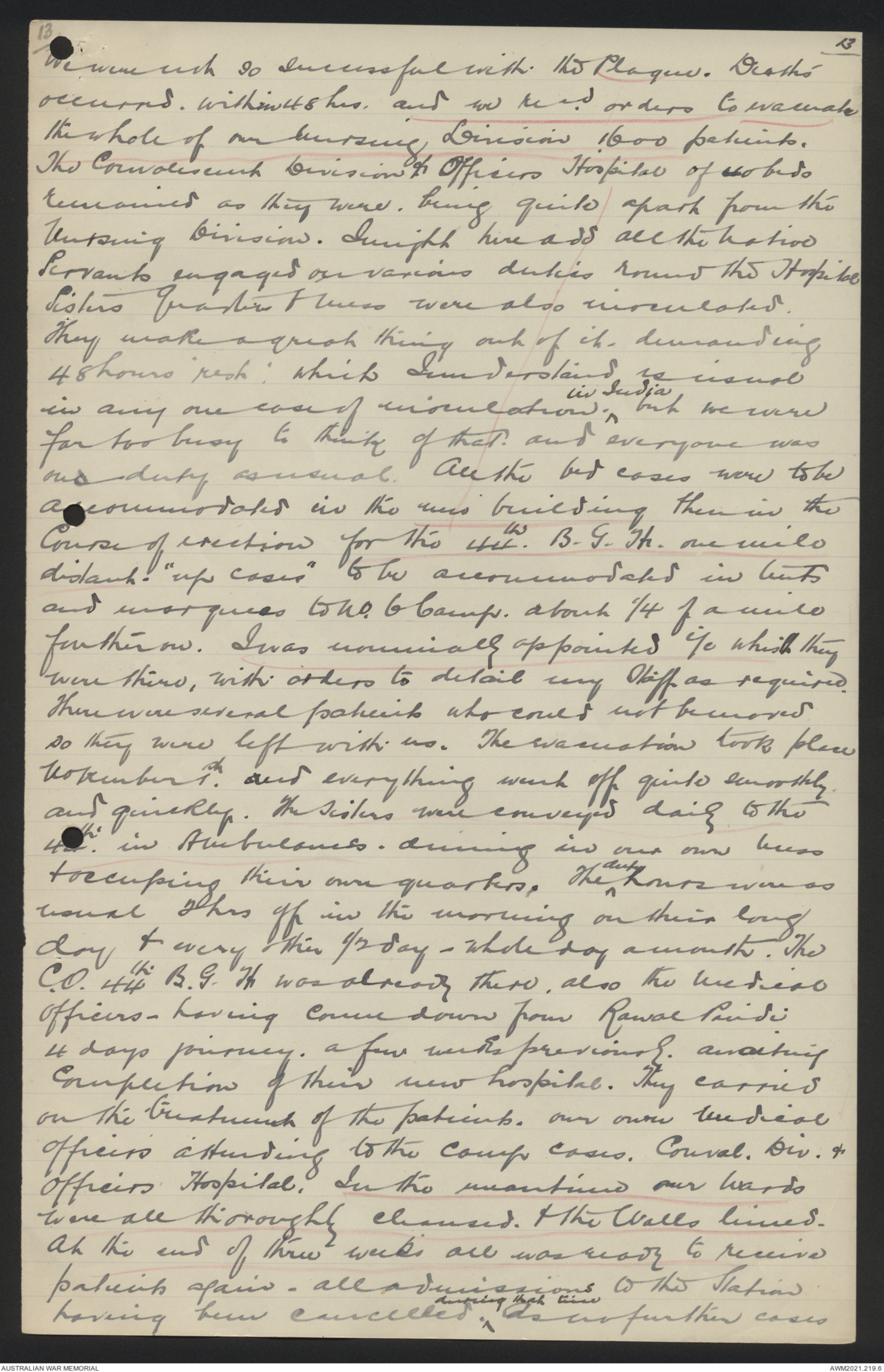
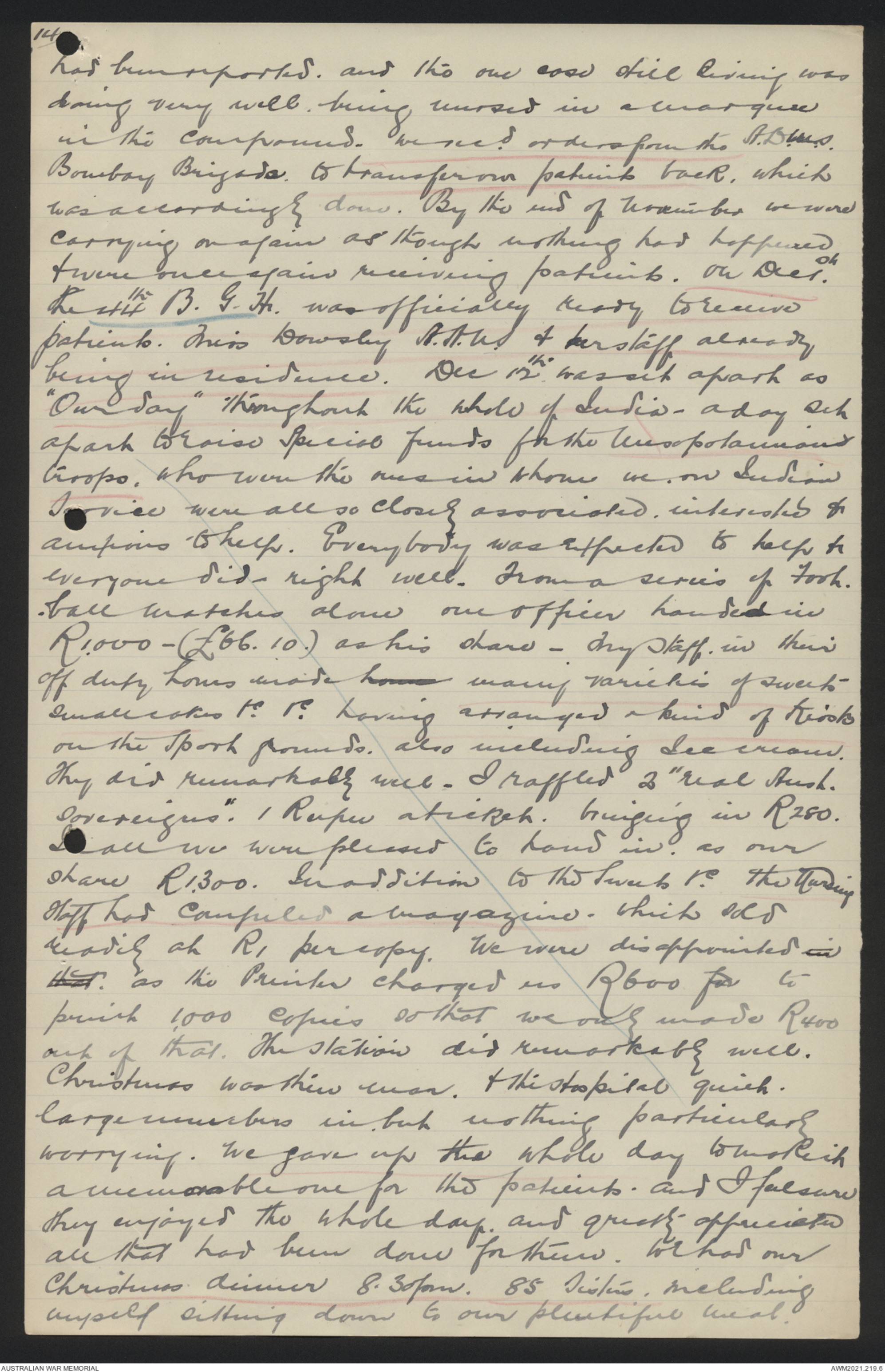
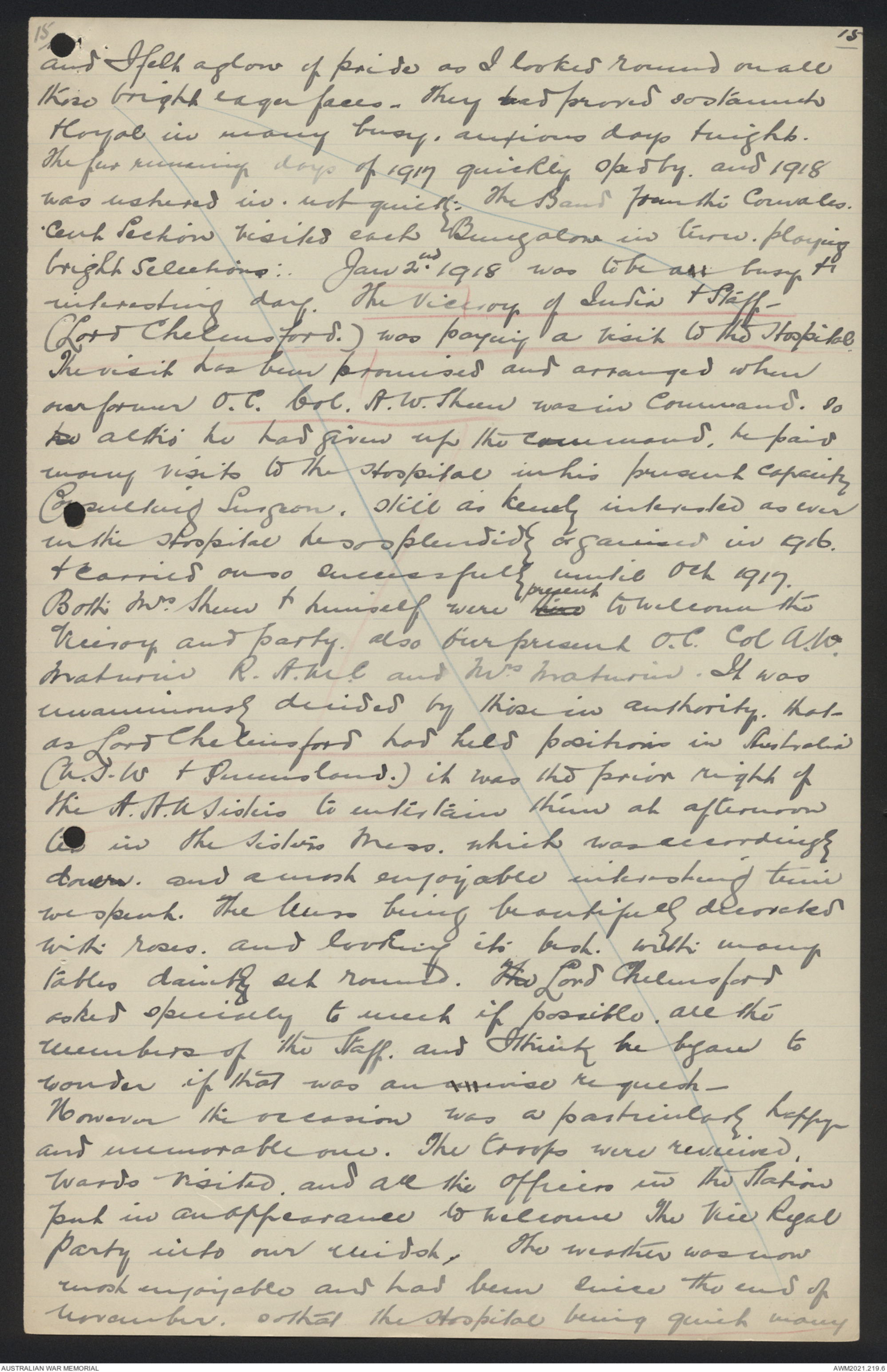
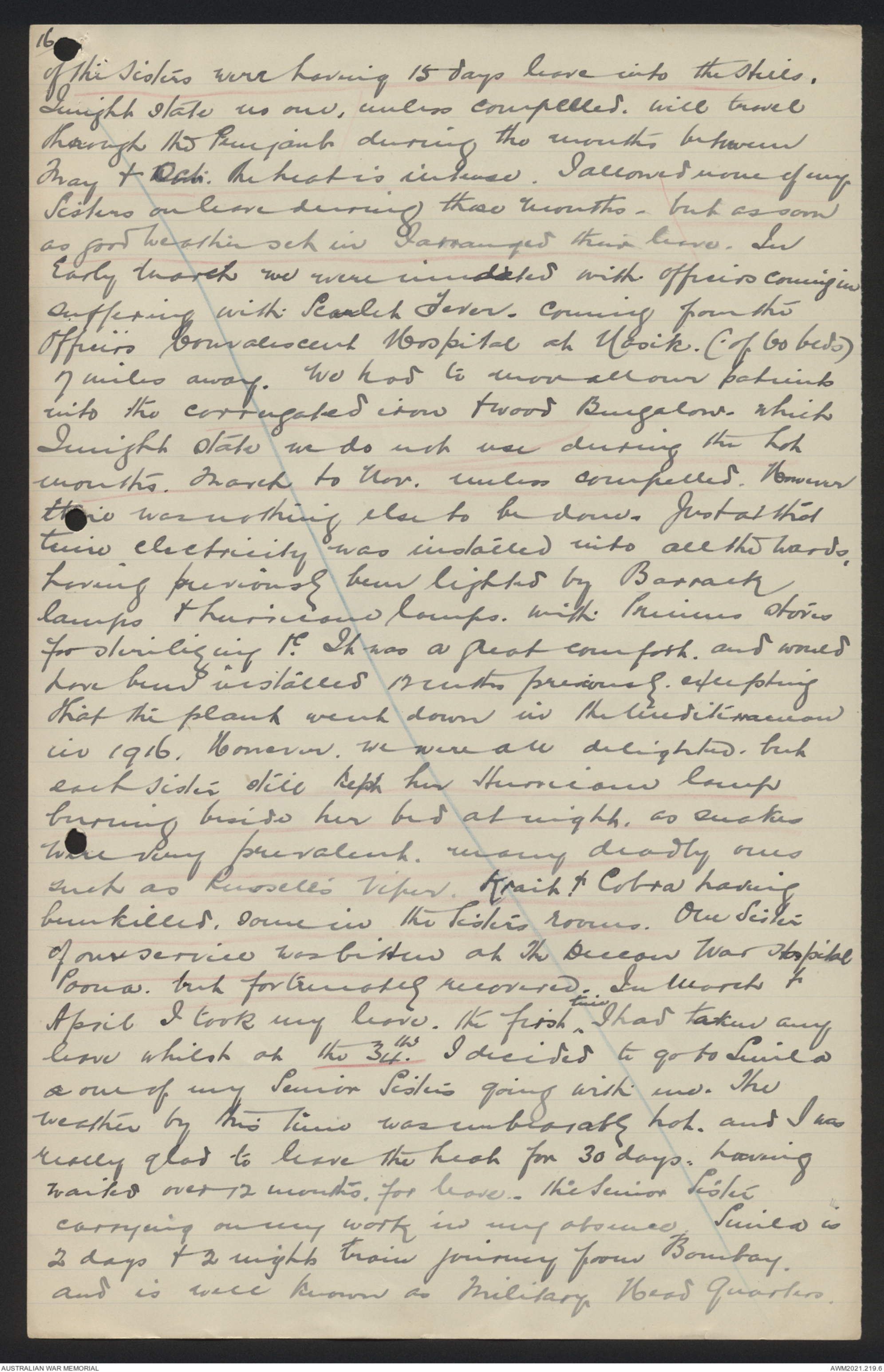
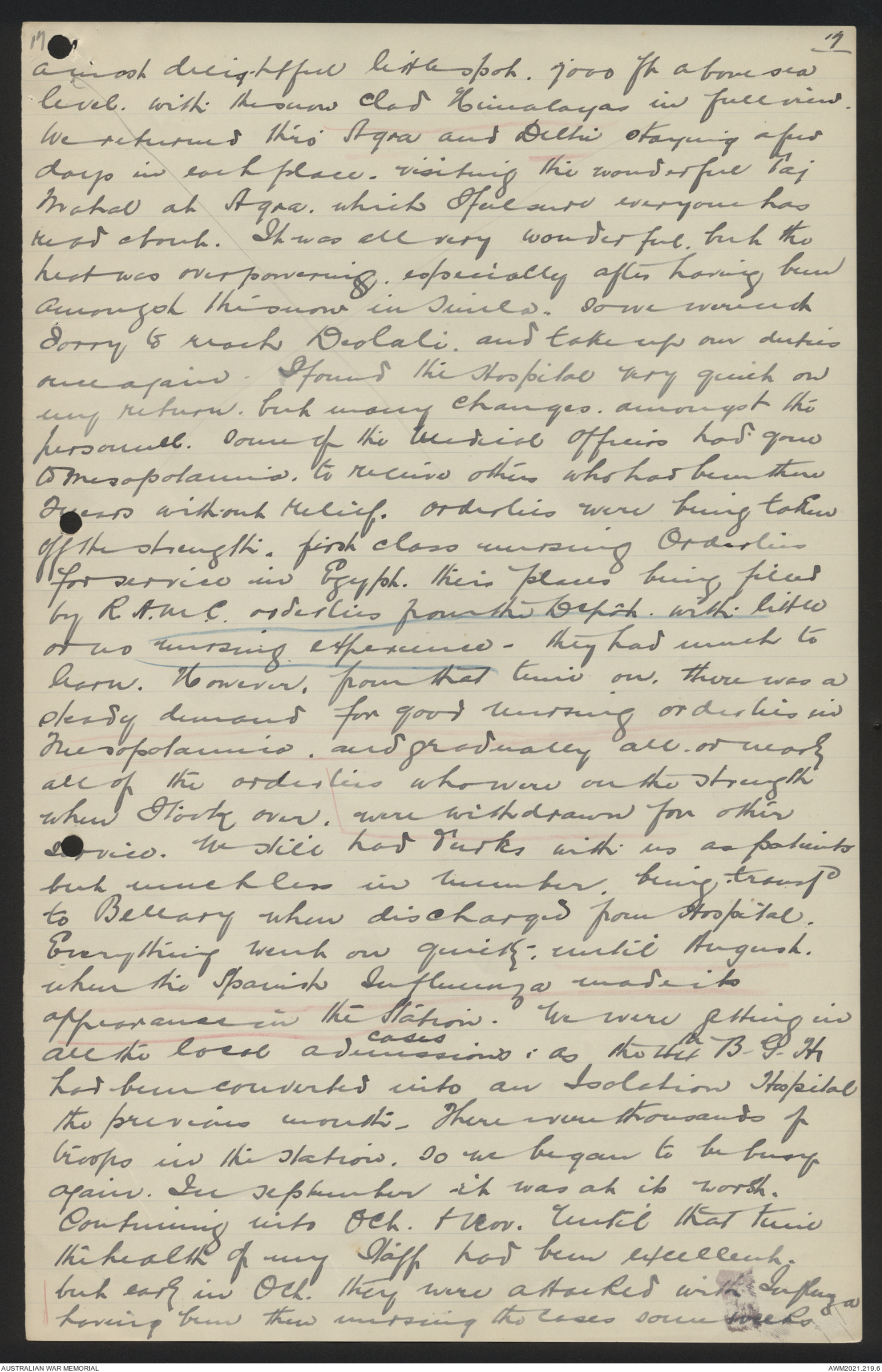
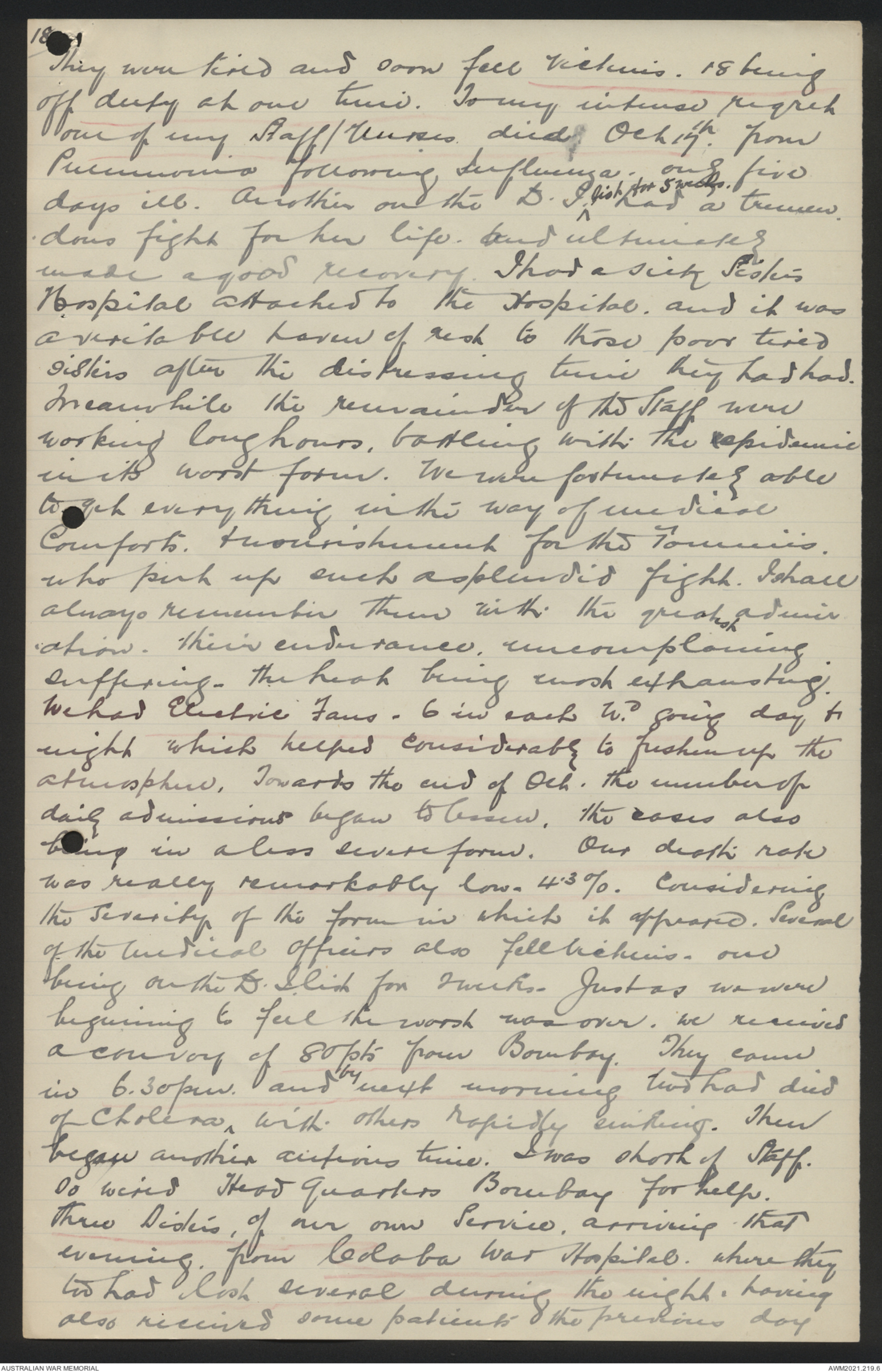
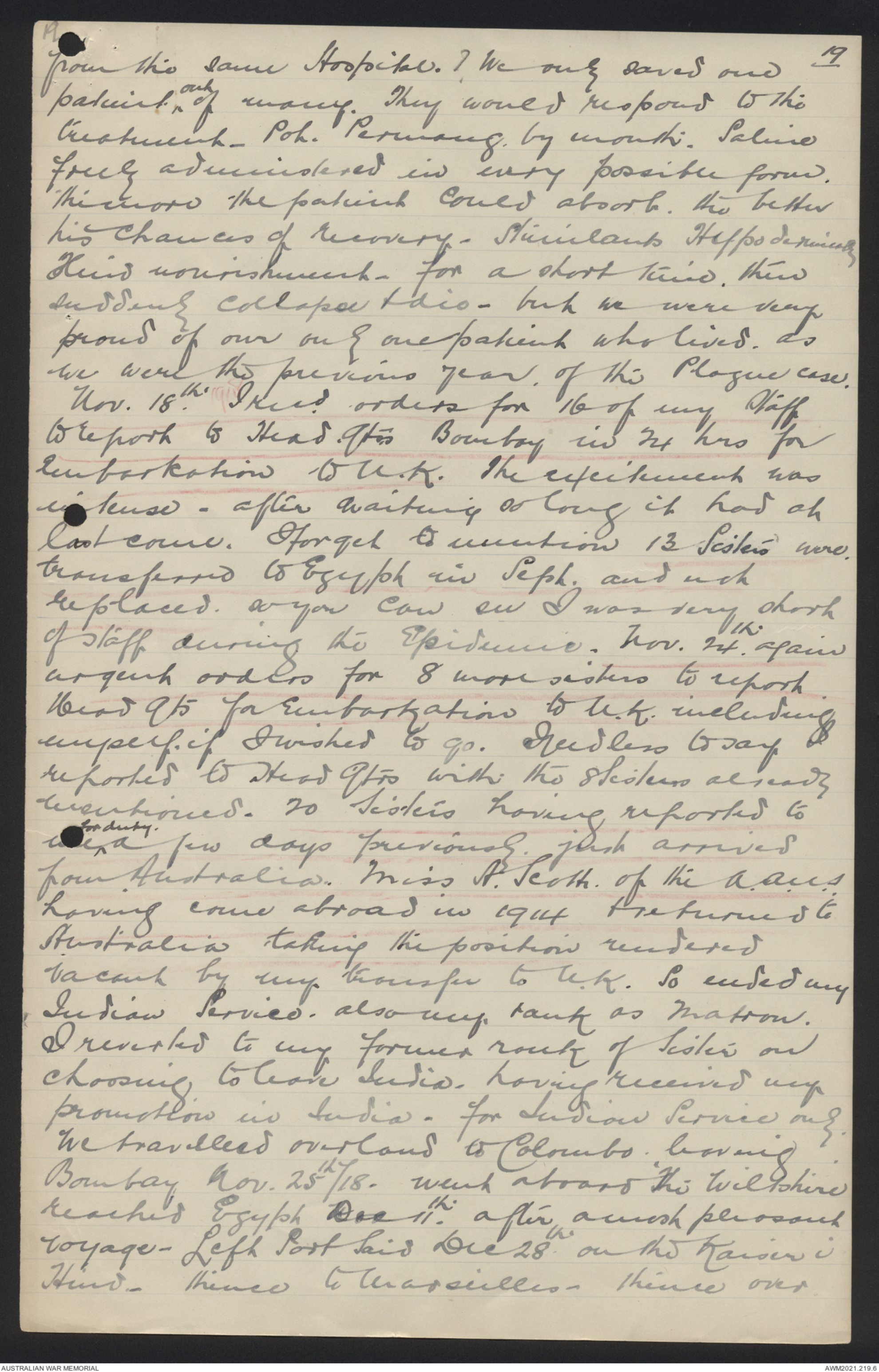
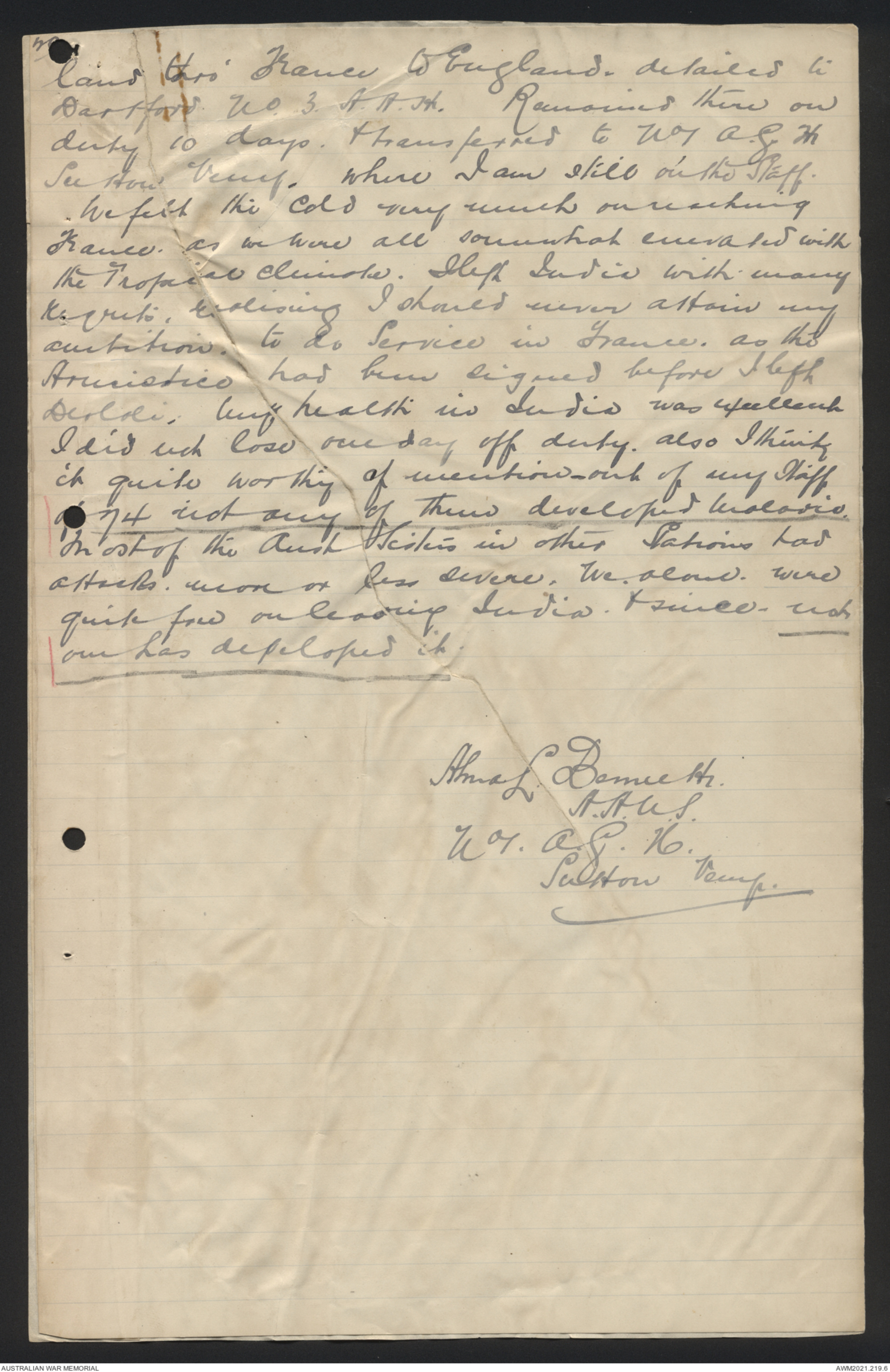
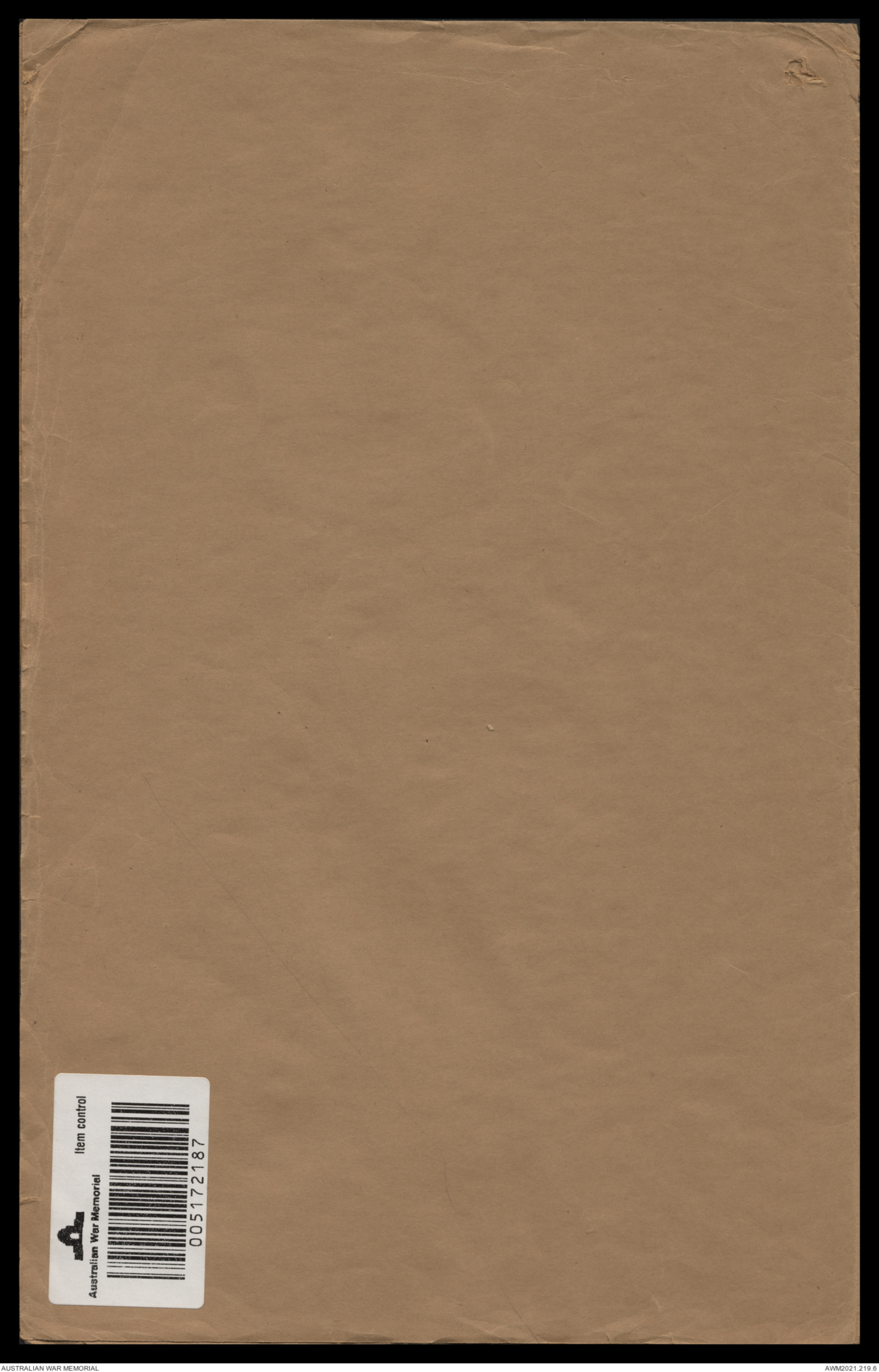
9
and I admit I was greatly relieved to see the
buildings of Bombay once again. When the Pilot
came on we feared of the fate of the P&O. Moldavia
having been mined the previous evening only
18 miles from Bombay, We had to spend a busy
morning getting all of patients dressed - all
Indian troops going ashore in white cotton suits &
turbans - quite interested in their personal appearance.
We had many heat stroke cases on
board but none had become any worse on the
voyage, and that was much to be thankful for.
To our intense disappointment we were informed
we were not to disembark until 8 o'clock
Monday morning. We were within sight of Bombay
& could not get across. So we had to wait until
Monday midday for our mail. We moved
quietly into port early Monday morning and
disembarked our patients quite satisfactorily. I
then reported our arrival to the Lady Supt. QAIMNSC
at Alexandra Docks, giving details of our trip
work accomplished & after seeing the two Sick
Sisters safely off in an Ambulance for the Sick
Sisters Hospital Colaba where they were all
well cared for & nursed. I was then informed
I had been appointed as matron in charge of the
34th Welsh General Hospital, Deolali. Containing
3,000 beds. 4 hrs train journey from Bombay
and staffd by Imperial Sisters - who had recd urgent
orders from Mesopotamia. My staff recd instructions
to report back to the V.W.H. then in charge of an
acting matron for a short time. Miss Davis having
left Bombay that morning for Deolali taking 45 Sisters
just arrived from Australia. I was rather anxious to see
Miss Davis. (then Principal Matron) as I knew nothing of
this new appointment. So after having a good nights rest
I took an early train next morning. There were marked
evidences every where of the monsoon. Sheets of rushing
streams of water in all directions. I reached my
10
destination to find some confusion. 45 nurses coming in
and 65 going out. However it was accomplished quite
comfortably and next day saw the A.A.N.S. established.
The Hospital had been organised exactly - 12 months previously
by Col. A. W. Sheen R. A. M.C. T.F.F as O/C and Miss Earl T.F.N.S.
as matron, with a staff of Imperial Sisters and R.A.M.C.
Personnel. leaving [[?Turkey]] in May 1916 reaching Bombay
June 1916. The Hospital consisted of Bungalows (Stone)
well built 50 years ago. for Garrison troops. and also
used by Troops resting in Deolali whilst travelling.
They made excellent Hospital Wards. having a small
pantry one end and duty room the other, wide
verandah all round, stone floors throughout, &
alternate windows & doors either side - and contain
ing 54 beds in the Wd. and 22 on the verandah and
side out. Attached to each ward were three marquees
each containing 12 beds. I might here say. I did
not like the beds. a frame work of wood with canvas
threaded thro' both sides and ends with fine rope and
lashed round the frame work of wood. The canvas
was continually splitting and the rope breaking.
We found it extremely difficult to replace either.
The mattresses were mostly of the three biscuit type
enclosed in one large linen cover. They were
quite satisfactory. Between Nov. 1916 & June 1917 twelve
new Bungalows same size capacity & design as the
Stone ones were erected. Built of corrugated iron & wood
with tiled roof. They were built on the spaces between
the other bungalows. Making in all 46 Bungalows for
Hospital accommodation. 12 of that number
accommodating the R.A.M.C. officers, Nursing
Staff & Administration Offices. The station was
purely military and the climate much better than
Bombay. (We had the usual monsoon season - it was
with us thru) The Hospital Covered an area of 1 mile
in length & 1/2 mile in width. We had an
excellent & up to date X Ray Dept. Also Electro
Therapeutic & all appliances for Exercising those
11
patients whose treatment required it - also a massage
Dept. Our results were exceedingly good. The Operating
Theatre had been converted out of a wash house, &
it was really remarkably good. taking that fact into
Consideration - A more up to date one was built
within the course of a few months. There were 740
patients in Hospital when we took over June 26th.
All the Sisters were at once innoculated against
Cholera, also myself, and it has little reaction. We
were well received by the Station people, all the
Residents calling on us, and giving us a cordial
welcome. A large garden party being given in
our honor about 10 days after our arrival. Work
in the Hospital went on steadily our patients
increasing rapidly in number. Our cases were
all from Mesopotamia. Some directly = others indirectly
coming from various Bombay Hospitals - when they
in turn of recd their Convoys. We also had
200 Turkish Prisoners of War. Almost all surgical
Cases, some with shocking wounds - septic. Each
week we recd Convoys, And September found us
with 2188 patients. My staff had been increased to
59 Aust Sisters & 15 Indian Temporary Nurses - 74
in all, including myself, my assistant H Sister,
Home sister mess Sister & massage Sister, leaving
68 for duty, both day & night. No more staff was
available and I was at a loss how to relieve the
pressure of work. For everyone was going at high
tension, if not with actual acute cases, dealing
with numbers. The theatre was very busy, in
fact every department, but everything ran
smoothly, and we all felt at the end of each day
we were indeed doing something, altho not where
we were all as anxious to be - either in Mesopotamia
or France. Having been loaned to the Indian Gov't
we were not eligible for Mesopotamia, as it
was then known as the Mesopotamian British Force
12
Both the C.O. and myself realised something must be
done, & we finally decided to segregate. all convalescent
Patients to Bungalows one end of the Hosiptal & all nursing
Cases to the other end, closer to the various Departments.
We called that Section the Convalescent Division - as
this was already a Convalescent Section where all
our patients passed into when discharged from Hos.
and given light duties. There were hundreds not
yet fit to go there, hence we found the Convalescent
Division a splendid idea. Each ward 86 beds. 12
more added to the verandah, was in Charge of
an R.A.M.C N.C.O and all the patients were up
Cases - each medical officer had 2 wards as well
as his wards in the Nursing Division. Any one
patient was not allowed to remain in those wards
more than 24 hrs if not well enough to be up - he
was then transferred back to the Nursing Division
I visited those wards daily, in addition to the
others, and found everything and everybody quite
satisfactory. At that time, to my great regret,
our O.C. recd orders to proceed to Bombay - he has
been appointed Consulting Surgeon to the Army of
Southern India. Our short four months
together had been most Congenial in every way.
His administration and discipline being excellent.
At that time, also, an outbreak of Small Pox occured
in one of the wards. followed in 3 weeks time
by an outbreak of Plague in another W.d Thus
began an strenuous and anxious time - all the Sho Sisters, Medical Officers & Orderlies - in fact
having to be vaccinated against Small Pox &
inoculated against Plague, also all the patient
Contacts. The vaccinations against Small Pox were in
most cases unsuccessful, and it was fortunate
the attacks were all of a mild nature. The
patients were immediately taken to a marque
& isolated. The Sisters nursing them sharing the
same fate. No deaths occurred.
13
We were not so successful with the Plague. Deaths
occurred. within 48 hrs. and we recd orders to evacuate
the whole of our Nursing Division 1600 patients.
The Convalescent Division& Officers Hospital of 40 beds
remained as they were. being quite apart from the
Nursing Division. I might here add all the native
servants engaged on various duties round the Hospital
Sisters quarters & mess were also inoculated.
They make a great thing out of it. demanding
48 hours 'rest'. which I understand is usual
in any one case of inoculation. in India but we were
far too busy to think of that. and everyone was
on duty as usual. All the bed cases were to be
accommodated in the mess building then in the
Course of erection for the 44th. B. G. H. one mile
distant. "up cases" to be accommodated in tents
and marquees to No. 6 Camp. about 1/4 of a mile
further on. I was nominally appointed i/c whilst they
were there, with orders to detail my Staff as required.
There were several patients who could not be moved
so they were left with us. The evacuation took place
November 1st. and everything went off quite smoothly.
and quickly. The Sisters were conveyed daily to the
44th. in Ambulances . dining in our own mess
& occuping their own quarters. The duty hours were as
usual 2 hrs off in the morning on their long
day & every other 1/2 day - whole day a month. The
C.O. 44th. B.G. H was already there. also the Medical
Officers - having come down from Rawal Pavidi
4 days journey. a few weeks previously. awaiting
Completion of their new hospital. They carried
on the treatment of the patients. our own Medical
Officers attending to the camp cases. Conval. Div. &
Officers Hospital. In the meantime our wards
were all thoroughly cleansed. & the Walls limed.
At the end of three weeks all was ready to receive
patients again - all admissions to the station
having been cancelled. during that time as no further cases
14
had been reported. and tho one case still living was
doing very well being nursed in in a marquee
in the compound. We recd orders from the A. D.[[ .S.]]
Bombay Brigade to transfer our patients back, which
was accordingly done. By the end of November we were
carrying on again as though nothing had happened
& were once again receiving patients. On Dec 1st
the 44th B.G.H was officially ready to receive
patients. Miss Dowsley A.A.N.S & her staff already
being in residence. Dec 12th was set apart as
"Our day" throughout the whole of India - a day set
apart to raise special funds for the Mesopotamian
troops. who were the ones in [[?show]] we on Indian
Service were all so closely associated, interested &
anxious to help. Everybody was expected to help &
everyone did - right well. From a series of foot
ball matches alone our officer handed in
R1,000 - (£66.10) as his share - day staff in their
off duty hours made home many varieties of sweets -
small cakes [[&c &c]] having arranged a kind of kiosk
on the Sport grounds. also including ice cream.
They did remarkably well - I raffled 2 "Real Aust.
Sovereigns" 1 Rupee a ticket. bringing in R280.
In all all we were pleased to hand in. as our
share R1300. In addition to the Sweets [[&c]] the Nursing
Staff had compiled a magazine. which sold
readily at R1 per copy. We were disappointed in that as the Printer charged us R600 for to
print 1000 copies so that we only made R400
out of that. The station did remarkably well.
Christmas was thin won & the Hospital quiet
large numbers in but nothing particularly
worrying. We gave up the whole day to make it
a memorable one for the patients. and I feel sure
they enjoyed the whole day. and greatly appreciated
all that had been done for them. We had our
Christmas dinner 8.30pm. 85 Sisters including
myself sitting down to our beautiful meal.
15
and I felt a glow of pride as I looked round on all
those bright eager faces. They had proved so staunch
& loyal in many busy, anxious days & nights.
The few remaining days of 1917 quickly sped by. and 1918
was ushered in not quickly. The Band from the [[Carnwales]]
[[Camp]] Section visits each Bungalow in turn. playing
bright selections. Jan 2nd 1918 was to be a busy &
interesting day. The Viceroy of India & Staff -
(Lord Chelmsford.) was paying a visit to the Hospital.
The visit has been promised and arranged when
over our former O.C. Col A.W.Sheen was in Command. So to altho he had given up the command he paid
many visits to the Hospital in his present capacity
Consulting Surgeon. Still as keenly interested as ever
in the Hospital he so splendidly organised in 1916.
& carried on so successfully until Oct 1917.
Both Mrs Sheen & himself were present there to welcome the
Viceroy and party. Also our present O.C. Col A.W
Maturin R.A.M.C and Mrs Maturin. It was
unaninmously decided by those in authority that
as Lord Chelmsford had held position in Australia
(N.S.W & Queensland.) it was the prior right of
the A.A.N Sisters to enterain them at afternoon
tea in the Sisters Mess. which was accordingly
done and a much enjoyable interesting time
we spent. The mess being beautifully decorated
with roses and looking its best with many
tables daintily set round. He Lord Chelmsford
asked specically to meet if possible all the
members of the Staff and I think he began to
wonder if that was an unwise request -
However the occasion was a particularly happy
and memorable one. The troops were received,
Wards visited, and all the Officers in the Station
put in an appearance to welcome the Vice Regal
Party into our midst. The weather was now
most enjoyable and had been since the end of
November. or that the Hospital being quiet many
16
of the Sisters were having 15 days leave into the Hills
I might state no one, unless compelled, will travel
through the Punjab during the months between
May & Dec the heat is intense. I allowed none of my
Sisters on leave during these months - but as soon
as good weather set in I arranged their leave. In
Early March we were innundated with Officers coming in
suffereing with Scarlet Fever. Coming from the
Officers Convalescent Hospital at Masik (of 60 beds)
7 miles away. We had to move all our patients
into the corruguated iron & wood Bungalow. which
I might state we do not use during the hot
months. March to Nov. unless compelled. However
there was nothing else to be done. Just at that
time electricity was installed into all the wards.
having previously been lighted by Barrack
lamps & hurricane lamps. with Primus stoves
for sterilising &c It was a great comfort and would
have been installed 12 months previously excepting
that the plant went down in the Mediteranean
in 1916. However, we were all delighted but
each Sister still kept her Hurricane lamp
burning beside her bed at night, as snakes
were very prevalent. many deadly ones
such as Russell's Viper. Krait & Cobra having
been killed. Some in the Sisters rooms. One Sister
of our service was bitten at the DecconWar Hospital
Poona. but fortunately recovered. In March &
April I took my leave. The first time I had taken any
leave whilst on the 34th. I decided to go to Simla
one of my Senior Sisters going with me. The
weather by this time was unbearably hot. and I was
really glad to leave the heat for 30 days. having
waited over 12 months for leave. The Senior Sister
carrying on my work in my absence. Simla] is
2 days & 2 nights train journey from Bombay.
and is well known as Military Head Quarters.
17
A most delightful little spot. 7000ft above sea
level. with the snow clad Himalayas in full view
We returned thro Agra and Delhi staying a few
days in each place. visiting the wonderful Taj
Mahal at Agra. which I feel sure everyone has
read about. It was all very wonderful. but the
heat was over powering especially after having been
amongst the snow in Simla. So we were not
sorry to reach Deolali and take up our duties
once again. I found the Hospital very quiet on
my return. but many changes amongst the
personel. Some of the Medical Officers had gone
to Mesopolamnia to relieve others to had been there
2 years with out relief. Orderlies were being taken
off the strength. first class nursing Orderlies
for service in Egypt. their places being filled
by R.A.M.C orderlies from the Depot with little
or no nursing experience - they had much to
learn. However, from that time on there was a
steady demand for good nursing orderlies in
Mesopotamnia. and gradually all our work
all of the orderlies who were on the strength
when I took over where withdrawn for other
service. We still had Turks with us as patients
but much less in November being transpd
to Bellary when discharged from Hospital.
Everything went on quietly - until August
when the Spanish Influenza made its
appearance in the Station. We were getting in
all the local admissions cases as No 44th B.G.H
had been converted into an Isolation Hospital
the previous month - There were thousands of
troops in the station. So we began to be busy
again. In September it was at its worst.
Continuing into Oct & Nov. Until that time
the health of my Staff had been excellent.
but early in Oct. they were attacked with influenza
having been then nursing tho cases some weeks
18
They were tired and soon fell victims. 18 being
off duty at one time. To my intense regret
one of my Staff/Nurses died Oct 17th from
Pneumonia following Influenza. only five
days ill. Another on the D.I list for 5 weeks had a tremen
dous fight for her life. and ultimately
made a good recovery. I had a sick Sisters
Hospital attached to the Hospital. and it was
a veritable haven of rest to those poor tired
Sisters after the distressing time they had had.
Meanwhile the remainder of the Staff were
working long hours, battling with the epidemic
in its worst form. We were fortunately able
to get everything in the way of medical
Comforts. & nourishment for the Tommies
who put up such a splendid fight. I shall
always remember them with the greatest admir
ation. their endurance, uncomplaining
suffering - the heat being most exhausting
We had electric fans - 6 in each Wd going day &
night which helped considerably to freshen up the
atmosphere. Towards the end of Oct. the number of
daily admissions began to lessen. The cases also
being in a less severe form. Our death rate
was really remarkably low. 4.3%. Considering
the severity of the form in which it appeared. Several
of the Medical Officers also fell victims and
being on the D.I. list for 2 weeks. Just as we were
beginning to feel the worst was over. we received
a convoy of 80 pts from Bombay. They came
in 6.30pm and by next morning two had died
of Cholera with others rapidly sinking. Then
began another anxious time. I was short of Staff
so wired Head Quarters Bombay for help.
Three Sisters of our own Service arriving that
evening from Colaba War Hospital. where they
too had lost several during the night having
also received some patients the previous day
19
from the same Hospital. I we only saved one
patient out of many. They would respond to the
treatment - Pot. Permang. by mouth. Saline
freely administered in every possible form.
the more the patient could absorb the better
his chances of recovery - stimulants Hypodermically
fluid nourishment - for a short time. then
suddenly collapse & die - but we were very
proud of our only one patient who lived. as
we were the previous year of the plague cases
Nov 18th I recd orders for 16 of my Staff
to report to Head Qtrs Bombay in 24 hrs for
embarkation to U.K. The excitement was
intense - after awaiting so long it had at
last come. I forget to mention 13 Sister were
transferred to Egypt in Sept. and not
replaced so you can see I was very short
of staff during the Epidemic. Nov 24th again
urgent orders for 8 more sisters to report
Head Qts for Embarkation to U.K. including
myself if I wished to go. Needless to say
reported to Head Qtrs with the 8 Sisters already
mentioned. 20 SIsters having reported to
me for duty a few days previously. just arrived
from Australia. Miss A. Scott of the A.A.N.S
having come abroad in 1914 & returned to
Australia taking the position rendered
vacant by my transfer to the U.K. So ended my
Indian Service also my rank as Matron.
I reverted to my former rank of Sister on
choosing to leave India. having received my
promotion in India. For Indian Service only.
We travelled overland to Colombo leaving
Bombay Nov 25th/18. went aboard the Wiltshire
reached Egypt Dec 11th after a most pleasant
voyage - Left Port Said Dec 28th on the Kaiser [[?]]
[[Hand]]- Thence to Marseilles - thence over
20
land thro' France to England. detailed to
Dartford No 3 A.A.H. Remained there on
duty 10 days. Transferred to No 1 A.G .H
Sutton Veny, where I am still on the staff.
We felt the cold very much on reaching
France as we were all somewhat enervated with
the Tropical climate. I left service with many
regrets, realising I should never attain my
ambition to do Service in France. as the
Armistice had been signed before I left
Delhi. My health in India was excellent
I did not lose one day off duty. also I think
it quite worthy of mention - out of my staff
of 74 not any of them developed malaria.
Most of the Aust Sisters in other Stations had
attacks. more or less severe. We alone were
quite few on leaving India. & since not
one has developed it.
Alma L Barnett
A.A.N.S.
No 1. A.G.H.
Sutton Veny
 Jacqueline Kennedy
Jacqueline KennedyThis transcription item is now locked to you for editing. To release the lock either Save your changes or Cancel.
This lock will be automatically released after 60 minutes of inactivity.